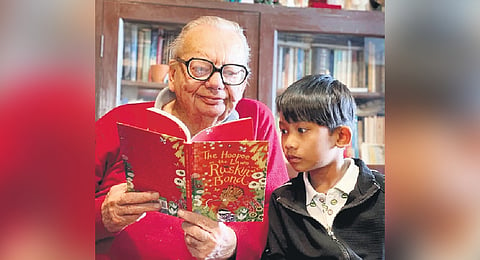

CHENNAI: High in the foothills of the Himalayas, surrounded by lush greenery and the cool embrace of winter mist, Ruskin Bond leads a quiet, unhurried life with his family. His is a simple existence, largely unchanged for decades, yet is rich with inspiration — one that has fuelled a literary legacy spanning generations. With over 500 short stories, essays, poetry collections, novels, and writings for both children and adults, Bond remains a prolific storyteller even at 90.
In recognition of his unparalleled contribution to literature and his role as a bridge between generations of readers, he was recently presented the Ramnath Goenka Sahithya Samman Lifetime Achievement Award for 2024 by The New Indian Express Group.
“A big award like this encourages me to keep writing a little longer, perhaps even long enough to pick up a few more awards!” says Bond. His charm is matched only by his humility.
The recognition feels particularly fitting for a writer whose works have shaped the imagination of generations of young Indians for nearly 70 years. From his small wooden cottage in Landour, Bond’s stories have touched readers of all ages. “I’ve met people who grew up reading my books. It’s lovely to have written for all generations and to still be doing so,” reflects Bond who turned 90 this year.
Nature’s narrator
Born to an English father and an Anglo-Indian mother in present-day Uttarakhand, Bond knew he wanted to be a writer from an early age. “I wasn’t much good at anything else except football, and I wasn’t good enough for Manchester United or Arsenal!” he shares.
After completing his schooling, Bond moved to the UK but returned to India soon after. The one highlight of the period was the publication of his first novel, The Room on the Roof — a semi-autobiographical story about Rusty, an orphaned Anglo-Indian boy — which earned him the John Llewellyn Rhys Prize. He was just 17 at the time.
“I thought, ‘Well, since this is something I enjoy doing, why not try to make a living from it?’” Bond recalls. “Of course, there were lots of ups and downs, but for most of these 70 years, I’ve been writing full-time and earning a reasonable income. I’ve had dozens of publishers over the years. I could write a book about publishers, though if I did, no one would publish me after that! (laughs)”
Initially a self-described serious writer focusing on adult fiction, Bond eventually shifted to children’s literature, a genre where he truly found his stride. His focus on timeless themes — childhood, nature, and human relationships — sets him apart.
“My stories don’t age because I don’t write much about political issues or topical events — those things date very quickly,” he explains. In today’s rapidly-urbanising India, Bond’s works serve as a portal to a simpler existence. “Most of the educated middle class in urban areas have little contact with nature. So, when they read about it, it appeals to them,” he reflects. “More and more young people want to have adventures and escape the cities.”
Keeping up with the times
At 90, Bond’s daily routine is simple. “Mornings are the best time for writing,” he says. “I sit in a sunny spot on the balcony and write for about half an hour to an hour. I’m a very lazy writer! After that, I have a good breakfast and then spend time reading or doing other things. Lunch is another highlight.
I’ve reached 90 without ever following any specific diets!” he laughs. “I’m probably a reader first and a writer second. I go through two or three books a week. I read for pleasure and enjoy good crime fiction, detective stories, and even old, forgotten books.” He still writes by hand, preferring the trusty ballpoint pen, which he calls “the greatest invention!”
This week, his latest work, Rhymes for the Times (Penguin India Puffin; `350), a collection of humorous poems and limericks, was released. “We live in a very nonsensical world today, so I thought I might as well write some nonsense!” he says. Reflecting on what keeps him writing, Bond says, “I find great pleasure in crafting sentences, telling stories, and reflecting on the past — people I’ve known and met. After all, stories are about people, and my interest in life drives me to put it all down.”
A ‘greedy’ writer
Bond’s Anglo-Indian heritage once made him feel like an outsider, but today he feels firmly rooted in Indian identity. “It’s not so much of a problem now, but 20 or 30 years ago, it was different. When I checked into a hotel, they’d ask for my passport, and ‘When did you arrive in India?’ My reply was always the same: ‘May 19, 1934 — I came by stork! I was dropped here!’” he laughs.
What does Bond hope for his works in the future? “It would be nice if children and adults continue reading my books. You could call me a greedy writer — I want readers of all kinds!” he shares. “If a writer can inspire young readers to take an interest in the natural world and books — what more could a writer ask for?”